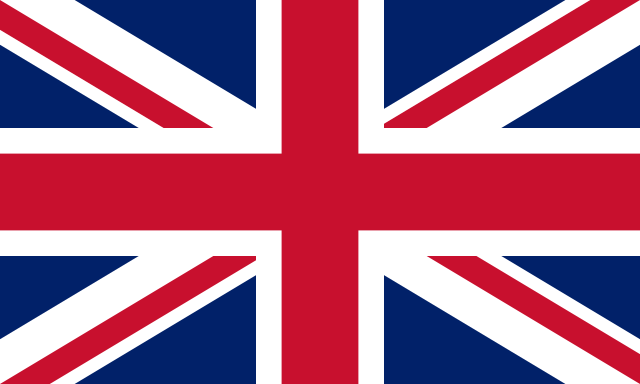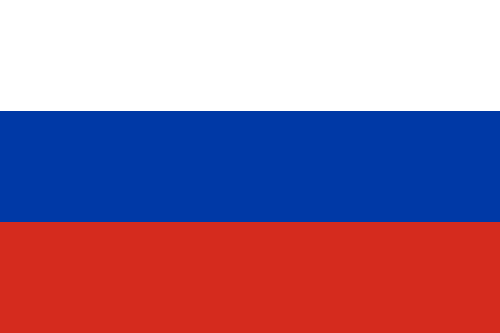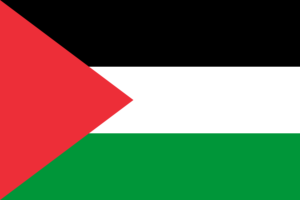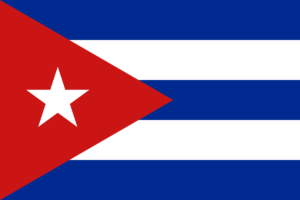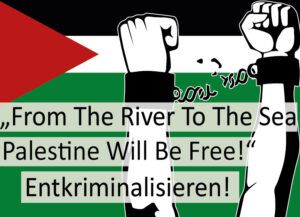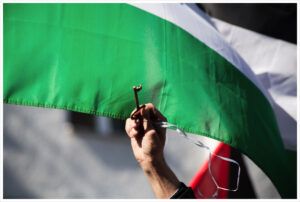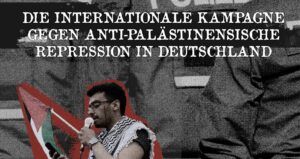Palestine says: “I was, I am, I shall be!” One year of the Al-Aqsa flood
Themen: Palästina

One year ago, the resistance in the Gaza Strip rose up to break out of the open-air prison, to disprove the myth of Israel’s invincibility, to remind the world that the Palestinians still exist, to bring the hundred-year war in Palestine hopefully to its final phase.
The “order” before the flood
The history of Palestine did not begin on October 7, 2023. We have been saying this for a year now. But it is important that we keep reminding ourselves of it. On the one hand, we must learn from history: from the history of more than a hundred years of struggle carried out by the Palestinians for their liberation, like the countless other struggles for liberation in the world. On the other hand, however, we must also recall what it was like before October 7.
Because in the face of the current situation – the almost incomprehensible suffering of the people of Gaza, the massacres that are now also befalling the Lebanese people, the assassination of various Palestinian and Lebanese leaders, the repeated escalations by Israel towards its neighbors, the lack of an uprising in the West Bank – it seems there are enough reasons to lose heart.
But how was it before the 7th of October? In Palestine, there was an “order”. The “order” of the Zionists, the “order” of creeping ethnic cleansing, the “order” of slow genocide, an “order” in which, on average, one Palestinian was murdered by the occupying army every day. And the Zionists and their imperialist allies had even managed to impose this “order” on the entire region: more and more Arab countries had “normalized” their relations with the settler regime.
The resistance in the West Bank, which was increasingly resorting to armed actions again, was able to disrupt the “order” in the West Bank, however it was unable to shake this regional “order” to its very foundations. This resistance was more than just a drop in the ocean. But to wash away the foundation of this “order”, it needed a flood.
Palestine After the Flood
This flood came on October 7. And it plunged the Zionist regime into an unprecedented crisis that encompasses all levels: domestic, foreign, economic, military and moral. Israel’s victories in the past were “Blitzkrieg victories”. A war of attrition, like the one that has been going on for a year now, is something the Zionist entity cannot afford. We can see that right now: the settler regime is crumbling at every turn.
More than 46,000 businesses have gone bankrupt since October, as has Israel’s only port on the Red Sea; tourism has completely collapsed, Israeli bonds are now worthless, and in June the Intel corporation withdrew a $25 billion investment.1 Most recently, Israel’s credit rating was downgraded again;2 the rating agency Moody’s is now warning of an “increased default risk”.3 Furthermore, the power supply is no longer secure since Colombia, Israel’s largest coal supplier, announced that it would stop exporting until the genocide in Gaza ended.4 Agriculture and the construction sector are extremely affected by the lack of cheap labor from the West Bank and Asian countries.5 Meanwhile, according to Israeli economists, the war has already cost more than $67 billion as of August.6
According to surveys, a quarter of the settler population is seriously considering emigration. Recent reports speak of up to 1 million settlers who have left the country since October,7 which would correspond to 15 percent of the Jewish-Israeli population. According to other surveys, 80 percent of Israelis living abroad do not want to return to Palestine.8 In addition, there are about 200,000 internally displaced persons from the north and the area around the Gaza Strip.9 The social divisions arising from all the contradictions and problems of the colonial system find expression in regular protests and clashes in the streets between the settler population and, in early September, a general strike by the Zionist “union” Histadrut. This polarization was further exacerbated by the fact that ultra-Orthodox Jews are now also to be drafted into the military. However, more than 93 percent of the Haredim who have been drafted so far refuse to serve in the military.10
Officially, 700 IDF soldiers have been killed in action since October 7, although many believe this number to be significantly too low.11 15,000 have been officially injured in Gaza,12 and 5,000 at the Lebanese border.13 However, for more than a month now, since Hezbollah carried out a retaliatory operation at the end of August, there has been increased censorship in Israel, especially in the north. In contrast, CNN reported that Israel has so far only permanently destroyed three of Hamas‘ 24 combat battalions.14 Although Hezbollah has also suffered extremely serious blows, it continues to demonstrate its high level of morale and fighting ability – while still tactically withholding their more advanced weapons for now.15 Meanwhile, Ansarullah in Yemen and the resistance militias in Iraq have so far defied sporadic attacks by Israel, the US and their allies, and have continued their own spectacular operations against Israel using missiles and drones.
The World After the Flood
The liberation struggle of the Palestinians has always had a regional and global significance: similar to the case of the apartheid regime in South Africa or the US genocide in Vietnam, Palestine always held up the racist, colonialist and imperialist character of the West for the entire world to see. Armed to its teeth, the white “master race” is massacring and expelling a people who are inferior in military, technical and economic terms, while receiving full support from Europe and North America. This is why the Palestinians, who often had nothing except their superior morality and fighting spirit, have always had the solidarity of all the oppressed and progressive people of the world.
The ‚Palestine question‘ was at the core of the so-called Middle East conflict, which originally referred to the decades-long struggle of the Arab countries against Zionist colonialism and expansionism – until more and more Arab regimes “normalized” their relations with Israel. But this “normalization” is now over! Even the most reactionary despots in the region must tremble before the anger of their peoples, who stand united behind the Palestinians, and are thus forced to make corresponding concessions. Furthermore, since October 7, it has become clear that an axis of resistance has indeed formed in the region, stretching from Gaza and the pockets of resistance in the West Bank to Lebanon, Syria, Iraq and as far as Yemen and Iran.
Simultaneously, the October 7 uprising occurred at a time when Western imperialism is crumbling and struggling to hold together its empire. For the imperialists, the Al-Aqsa flood came at an inopportune time: At a time when the US was struggling with the question of whether it could wage war against Russia and China at the same time, or whether it would be better to abandon Ukraine in favor of Taiwan, the “order” in the Middle East that had been established for years through dollar diplomacy and „normalization“ on the backs of the Palestinians collapsed in a matter of a single day.
Palestine and the entire region have thus objectively become, alongside Ukraine, the Pacific and West Africa, a hot front in the current great war to defeat 500 years of Western world domination. This does not mean that the actors – the Palestinian resistance, the Axis of Resistance, Russia, China and the Alliance of Sahel States – have yet subjectively come to see themselves as such an anti-Western and anti-imperialist front. Even though there is an increasing number of bilateral initiatives in the form of mutual military, economic and political support between various actors, and also BRICS whose multilateral approach is becoming more and more attractive to many, there exist still major differences, numerous clashes of interests or simply hardly any concrete contacts.
Germany after the flood
And yet: the Al-Aqsa flood has put Palestine back on the worldwide agenda, including here in Germany. Even before October 7, the repression against activists of Palestine solidarity in the Federal Republic of Germany was completely disproportionate. And yet the Gaza uprising has triggered a wave of racist hysteria and a frenzy of repression the likes of which this country has not seen in decades and the extent of which may have taken most by surprise.
Why? Because Germany’s unconditional solidarity with the colonial project in Palestine in the form of the called so-called ‚reason of state‘ is a fundamental component of the current official ideology of legitimization of German imperialism: “Never again Auschwitz” from the mouth of the ruling class in Germany means: “Never again war without us!” It means: “The world may recover by the new German character!”16 it means: “Our place in the sun17 is called Israel”.
Like the Russian military intervention in Ukraine, the Gaza uprising is both an expression of and a further impetus to the acute crisis of imperialism, which will hopefully put an end to the old-world order once and for all and at the same time creating new spaces for national liberation movements and revolutionary forces around the world. And just as the war in Ukraine, so too the genocide in Gaza is forcing the progressive and peace forces, as well as the broad population in Germany, to take a stand on this development.
The result is a mixed bag, as one might expect given the conditions in this country: a broad solidarity movement with the Palestinians that encompasses all sections of the population has so far failed to materialize. Also, there is obviously currently only a small overlap between those who take to the streets against the war in Ukraine and those who protest against the Gaza genocide. Nevertheless, masses of people have been and are still being stirred up by the images and reports from Palestine and now also from Lebanon and are increasingly being driven onto the streets. Many have also recognized the necessity of organizing, resulting in the emergence of numerous new pro-Palestine groups. Here, too, the calm and “order” of those in power are faltering.
The political left is also positioning itself better and more clearly overall than it is doing in the case of the Ukraine war. On the one hand, it is easier to recognize the Palestinians as victims of Zionist colonialism than to recognize Russia as a victim of Western imperialism. On the other hand, one should not underestimate the continuing solidarity in the face of massive agitation and repression: Despite widespread problematic positions, for example with regard to the Islamic actors, the left-wing Palestinian movement as a whole is resisting the pressure from the ruling circles in Germany to distance itself from solidarity with Palestine and from solidarity with pro Palestinian actors and create divisions within the movement. However, this does not apply to the Palestinian movement as a whole in Germany, which not only includes the political left. And its fragmentation is still severe.
To summarize: the Al-Aqsa flood challenged us as a solidarity movement, and it still challenges us. We have “passed” in that we continue to be unshakeable in our solidarity, have been taking to the streets for a year, standing up to the rulers and their thugs, and loudly contradicting the silence and the lies. Many actors have also revised, sharpened and improved their political positions on Palestine in the face of the confrontation forced upon them.
Furthermore, we were also forced to place the struggle to defend our own fundamental rights higher on the agenda. It must be clear to us that the positive development on the international stage, namely the global weakening of the imperialist world “order”, will increasingly mean harsher conditions for us who live and struggle here in the imperialist centers. What we have been experiencing since October 2023 is likely only a taste of what is to come.
This also brings us to our own limits, which the Al-Aqsa flood has shown us: the Palestine, peace, left and communist movements lack unity and, above all, a unified strategy. This applies both to the question of what solidarity actually looks like and how we can develop a solidarity whose effects reach the people in Palestine. And also, for the fight against the dismantling of democracy, which so severely limits our solidarity work. The task of answering these questions was put to us concretely on October 7.
The wretched of the earth are calling to the last stand
We don’t know whether October 7 actually marks the beginning of the end of settler colonialism in Palestine, as a comrade from the Palestinian Communist Party predicted. After a year of trepidation, suffering and struggle, however, we should be clear: it is bad and it will probably get worse. Anyone who thought on October 7, 2023 that Palestine would be free in a year was proven wrong. Those who hoped for rapid, direct, large-scale military intervention by Lebanon, Iran or other states were just as disappointed as all those who relied on the UN and the “international community”.
The past year was an emotional rollercoaster: Overwhelming joy and elation were quickly followed by shock and horror, and fierce defiance was followed by fear and disappointment. We must learn the lesson: The phase that began on October 7 will be one of a long-lasting war of liberation, a slowly escalating war of attrition and wear and tear. Because of the nature of this colonial war, Palestinians and other Arabs will continue to die in the first place. And: It will be a hard time full of successes and setbacks, full of hope and joy and full of despair, sadness, fear and anger, full of uncertainty and insecurity, full of lies and rumors.
The 7th of October was the result of an unbearable culmination of contradictions in the region. It was a response to the betrayal by the Palestinian leadership in Ramallah and numerous Arab and Muslim countries. It was an outcry in the face of the ignorance of the world. It was the angry attempt of an oppressed and militarily inferior people to show that their oppressor is not all-powerful. And in this sense, it was already successful: October 7 proved that the Zionists‘ “order” is built on sand. Gaza marched and shouted the old slogan of revolutionary Cuba to the world: “Homeland or Death!” Palestine rose up and proclaimed before everyone’s eyes: “I was, I am, I shall be!”18
- https://mondoweiss.net/2024/07/the-end-of-israels-economy/ ↩︎
- https://thecradle.co/articles/sp-joins-moodys-in-downgrading-israel-credit-rating ↩︎
- https://www.deltavalue.de/moodys-rating/ ↩︎
- https://mondoweiss.net/2024/07/the-end-of-israels-economy/ ↩︎
- https://www.jungewelt.de/artikel/480919.versch%C3%A4rfte-ausbeutung-israel-wirbt-indische-arbeiter-an.html ↩︎
- https://www.aa.com.tr/en/economy/israeli-war-costs-economy-over-673-billion-economists/3304597 ↩︎
- de.irna.ir/news/85571472/ ↩︎
- https://thecradle.co/articles-id/23976 ↩︎
- https://www.bpb.de/kurz-knapp/hintergrund-aktuell/547184/sechs-monate-nach-dem-angriff-der-hamas-auf-israel-chronologie-des-kriegsgeschehens/ ↩︎
- https://thecradle.co/articles/only-70-out-of-1100-ultra-orthodox-jews-complied-with-draft-orders-israeli-army ↩︎
- https://t.me/almayadeenenglish/4395 ↩︎
- https://thecradle.co/articles/israel-recalls-15000-reservists-as-casualties-in-gaza-mount ↩︎
- https://thecradle.co/articles/israeli-hospitals-record-over-5000-wounded-in-fight-against-hezbollah ↩︎
- https://edition.cnn.com/interactive/2024/08/middleeast/gaza-israel-hamas-battalions-invs-intl/ ↩︎
- https://occupiednews.com/militaerische-analyse-was-macht-hisbollah ↩︎
- “The world may recover from the German character” („Am deutschen Wesen mag die Welt genesen“) comes from a poem by Emanuel Geibel and was adopted by Kaiser Wilhelm II to legitimize Germany’s imperialist interests in the sense of a ‘German Man’s Burden’. ↩︎
- The phrase “our place in the sun” („unser Platz an der Sonne“) was used in the German Empire to justify the claim to colonies vis-à-vis the other imperialist powers. ↩︎
- On January 14, 1919, Rosa Luxemburg’s last text was published under the title “Order Prevails in Berlin”, just a few hours after the Spartacus Uprising in Berlin had been crushed and before she and Karl Liebknecht were murdered. The text ended with the following quote: ““Order prevails in Berlin!” You foolish lackeys! Your “order” is built on sand. Tomorrow the revolution will “rise up again, clashing its weapons,” and to your horror it will proclaim with trumpets blazing: I was, I am, I shall be!“ ↩︎
